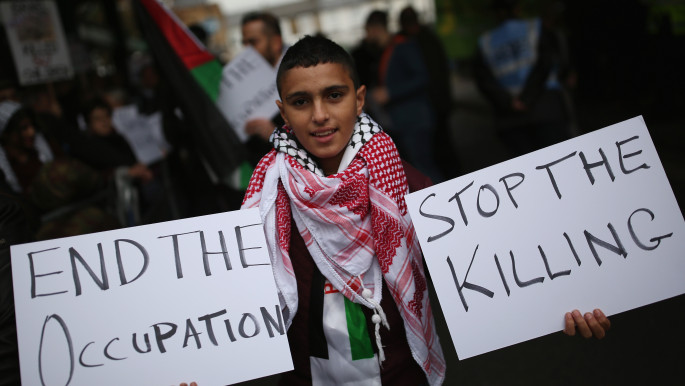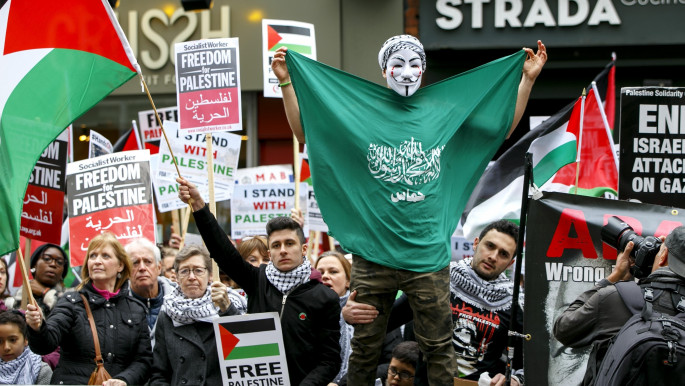
London shows solidarity with Palestine
Thousands of protesters took to the streets of London's Kensington outside the Israeli embassy this weekend to protest against the ongoing violence against Palestinians under occupation.
In the occupied Palestinian territories, as well as inside Israel, clashes between Palestinians and Israeli security forces have been escalating since the beginning of this month, with fears of the violence leading to a third intifada.
Since October 1, 41 Palestinians have been killed by Israeli fire, including 20 labelled as "attackers", and the rest in clashes with Israeli troops. Thousands more have reportedly been injured.
"We have come together to oppose this escalating attack on Palestinians," read a statement by the Palestine Solidarity Campaign, one of the main organisers of the protest.
"We welcome all who stand with us in our opposition to all forms of racism, including anti-Semitism and Islamophobia," the statement added.
Sowing fear and encouraging vigilantism
 |
|
| Palestinian activists take to the streets of London [Getty] |
The unrest erupted in Jerusalem over tensions surrounding al-Aqsa Mosque compound in Jerusalem.
It soon spread to Palestinian neighbourhoods of East Jerusalem and then to the West Bank, Gaza and Israel proper.
On Sunday night, an innocent Eritrean migrant, identified as Habtom Zerhom, was "mistakenly" shot by an Israeli security guard in the southern Israeli city of Beersheba.
Israeli forces and a mob of the public wrongly believed he was involved in a stabbing attack. He was savagely attacked by bystanders and died of his wounds the following day.
The Israeli daily newspaper Yediot Ahronot left no ambiguity as to exactly why the man was shot. Monday's headline read: Just because of his skin colour.
Haaretz went on to say that his death was the result of the Israeli government sowing fear and encouraging vigilantism.
"We are a law-abiding country. No one must take the law into their own hands," Israeli leader Binyamin Netanyahu said following the lynching - but yet violence continues to escalate, and many continue to take the "law into their own hands".
UK solidarity
"We felt that bringing people together outside the Israeli embassy helps gather momentum and solidarity," proetst organisers said.
"We needed to do something more disruptive and visible due to the British government's silence over the continued occupation of Palestine and its continued arms trade with Israel," the group added.
Official government figures reveal that the UK approved £4 million [$6.2m] of arms sales to Israel in the four months that followed last year's bombardment of Gaza, according to a press release by the group.
During last summer's 51-day war, more than 2,000 Palestinians were killed, 10,000 were left wounded and 100,000 were left homeless. The conflict left more than 500 children dead and 3,000 injured.
"The British government profits from the occupation - and the mainstream British media continually label Palestinians as terrorists or aggressors, with no background of what really leads to the increase in violence," the statement added.
Kensington to Oxford Street
 |
|
| Palestinian activists take to the streets of London [Getty] |
During the demonstrations, the campaigners moved onto London's famed Oxford Street, bringing traffic to a standstill.
Around 100 people from the activist group London Palestine Action held signs declaring their solidarity with armed Palestinian resistance groups.
Police accompanied the protesters for much of the route.
London Transport said that ten buses were diverted due to the protest.
"The [Israeli] embassy is closed on a Saturday," pointed out Abu Mahmoud, one of the organisers.
"So we needed to do something specifically to show our support to the Palestinian people," he added.
At one point during the demonstrations, protesters unleashed smoke cannisters in the colourful shades of the Palestinian flag.
The protest ended outside the BBC News building nearby, which has frequently come under fire for its alleged pro-Israel bias.
An independent commission in 2008 which reviewed the organisation's presentation of the conflict found short-comings in the BBC's reporting of the difficulties faced by Palestinians.





 Follow the Middle East's top stories in English at The New Arab on Google News
Follow the Middle East's top stories in English at The New Arab on Google News


